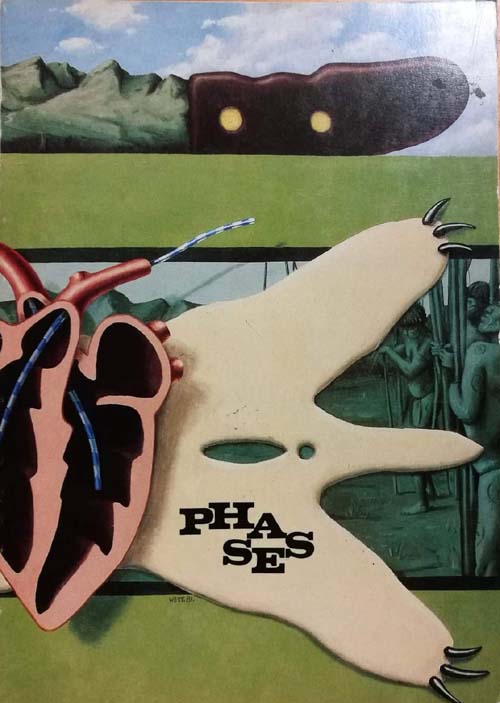
28 June, 18 – 20 October, 19 Room Philip West. First Floor
By 1969, the Surrealist movement was no longer at the peak of its maximum splendour, but some artists refused to give it up. From the British “underground,” Philp West (York, England 1949–Zaragoza 1997) represents this spirit of the continuity of surrealism as an art and way of life.
His work, full of fantastic worlds and Dantesque scenes, is a revision of the history of surrealism from a very personal point of view, featuring his own iconography, in which he contemplates first-hand the influences of the great exponents in the middle of the century, such as Magritte, De Chirico or Max Ernst.
This fascination for his predecessors is reflected in his library, which features numerous books by André Breton, the father of surrealism, Luis Buñuel, the Aragonese film director, Marcel Duchamp, as well as a select collection of surrealist journals and works by his extensive circle of friends, including Octavio Paz, Enríque Gómez Correa, Ludwig Zeller and Eugenio Granell, with whom he had a very close professional and personal relationship.
As a result of this friendship, Philip West, at the end of his life, decided to donate a large part of his plastic work and this important library to the Eugenio Granell Foundation, where it is kept today. It is made up of more than 753 documents, including, as mentioned above, a large amount of Breton’s work, with more than 43 volumes, and of Buñuel’s, which is a reflection of West’s interest in surrealist cinema.
The main space is devoted to West himself, his catalogues, his correspondence, in which he enclosed small cards with his paintings, drawings and mainly his publications in the most important surrealist journals. These include issue 5 of the Dutch journal Brumes Blondes, whose cover reproduces his artwork Cascade; copies of Transformaction, edited by his English friend and mentor John Lyle; collaborations with the French artist Edouard Jaguer’s Phases group; or several copies of Canada’s El huevo filosófico, in which he collaborated actively with the couple made up of Ludwig Zeller and Susana Wald, who were important friends of West’s.
The next section is centred on West’s sources of inspiration and his relationship with numerous international and local surrealist groups. Such influences include the image of André Breton and Luis Buñuel, as well as copies devoted to Marcel Duchamp, Max Ernst, René Magritte or Salvador Dalí, mainly books and manuals. On the other hand, there are works by his extensive circle of friends, especially England’s John Lyle, who was his teacher at the beginning of his artistic career; France’s Edouard Jaguer; the couple made up of Chile’s Ludwig Zeller and Hungary’s
Susana Wald, the Mexican poet Octavio Paz;the Chilean poet Enrique Gómez Correa, who published the book of poetry Mother Darkness, which would directly influence West’s painting of the same name; Portugal’s Mario Cesariny de Vasconçelos; Buñuel’s biographer José Francisco de Aranda, thanks to whom he gained insight into the universal Aragonese artist’s work; among others.
Journals are a central feature of this exhibition; their aesthetic value, their dedications and their singularity make them small surrealist gems that West collected throughout his life from different parts of the world. The following copies stand out: Melé, Carta internacional de poesía, published in Honolulu, USA, by Austria’s Stefan Baciu, in which he dedicates one of the works decorating the exhibition Poet. El poeta (y su poema) to his friend Octavio Paz; the French journal published by surrealist artists Ellebore;Óscar González’s Colombian journal Cantidad hechizada; and Surrealisme Même (1957) edited by Breton.
The doors to Philip West’s library will be left open in this exhibition, to show the public the hidden gems on its shelves. His direct relationship with Granell plays an important role, including letters and dedications between both artists, as a faithful reflection of their friendship.
Completing the itinerary is Philip West’s oil painting Hombre del mundo accompanied by one of the most striking catalogues, that of the exhibition Viajes a las regiones tropicales held in Venezuela in 1981. A fitting corollary to summarise the image of an ever-changing man, who left cold England for the Spanish city of Zaragoza and thereafter went to live in Venezuela for five years, where he would grasp first-hand the concept of metamorphosis, later returning to the region of Aragon, where he would participate with surrealist artists and contribute to publications in the Editorial Pórtico publishing company. That is the time when he met Granell. He would spend the last days of his life in Zaragoza. Something that perfectly defines Philip West is the words that Granell himself dedicated to him in the catalogue of Philip West’s works in the Eugenio Granell Foundation: Light that never goes out.



